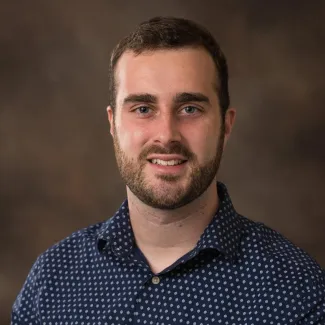
PhD student Owen Monroe reflects on his internship with the National Endowment for the Humanities Office of Digital Humanities, held from May to December 2024. Last month, the NEH programs officer Monroe worked with during his internship discussed some of their work at the Digital Humanities conference in Lisbon, Portugal.
Where did you work, and what was your role?
I worked as a Pathways intern at the National Endowment for the Humanities (NEH) Office of Digital Humanities. I researched and reviewed the sustainability of digital projects funded by the Endowment. I reviewed a selection of projects, including online platforms and cultural heritage collections, to determine if their websites were available and functional years after their inception. I also interviewed leaders about the challenges they faced and decisions they made to maintain, change, or archive their projects. My work contributed to NEH's consideration of building a new grant program to support digital project maintenance, and I developed an internal report for the organization.
How did you find out about the internship?
I learned about this internship during a conversation with my advisor Professor Zoe LeBlanc. The NEH Office of Digital Humanities (ODH) has funded work from researchers at the iSchool, and this internship was a great opportunity to work with a leading institution that supports innovative research and public learning in the humanities.
What new skills did you acquire?
I acquired new skills in working with data on project funding and performance while also engaging with the personal experiences of project developers through extensive interviewing. I learned to solve problems by working through the limitations of institutions and technology, along with the different perspectives and ideals of researchers. I learned to think at both big and small scales, a strategy familiar to literary study in digital humanities. My research involved a large, diverse array of digital projects and many long interviews. This seemed intimidating at first, but I found ways to group projects and sustainability needs together, moving from a large assembly to a smaller number of defined perspectives. I was then able to approach interviews with questions better crafted to the challenges and concerns of specific projects, and through person-to-person conversation, great ideas and solutions often emerged at the sentence level.
I learned to think through these expert perspectives and experiences to find where needs and goals overlap, and how NEH could provide support through the resources available. It has been particularly interesting to see how colleagues in the ODH created support to bring these projects into the world and continued to consider new support systems to fit changing needs over time. It has been fascinating to think through the major issue of maintaining both humanities data and accessible user experiences into the future, while upholding the needs to advance research and connect to communities and public audiences.
What did you like best about working at the NEH Office of Digital Humanities?
I liked working in the ODH because it combined my interests in research and public service. As an undergraduate, I interned for a couple of nonprofit arts organizations and was exposed to important skills and processes like strategic planning, grant writing, and creating connections with people and local organizations. I became interested in NEH because it approaches fundraising from the other side: providing grant funding and support to organizations and scholars. I also enjoyed working for a public-serving government agency. After college, I was a public-school teacher in Chicago through the Teach For America program. My experience with AmeriCorps showed me the value of national service built on learning, leadership, and relationships.
The ODH has done impressive work in supporting both innovative research in the digital humanities and public-facing platforms and projects. I see my work with NEH as an extension of my commitment to national service in the public humanities and education, as well as my exploration of how digital technology can make the humanities exciting and accessible in our new information age. Additionally, I have been very supported by my colleagues at the ODH to contribute towards their goals on digital sustainability, while NEH provided many opportunities to make connections with other interns and professionals, learn more about the agency, and receive mentorship on various aspects of my career and graduate education.
What would you advise current students who are interested in an internship opportunity?
I advise students to pursue work with mission-driven organizations that appeal to them and to explore a variety of opportunities within their field or topic of interest. NEH is a large agency with many divisions and offices and a history of dedication to research, public humanities, and education. I was interested in NEH's work and mission, as well as all the mentorship and support it provided to interns. I suggest that students think beyond conducting their own research and consider opportunities within the larger ecosystems that support research and education, connect to communities, and serve the public interest. Working with professionals to strategize new support for innovative research and the public humanities was very rewarding, as well as an excellent complement to my own work and research as a student at the iSchool.
This article is reposted from the School of Information Sciences website.